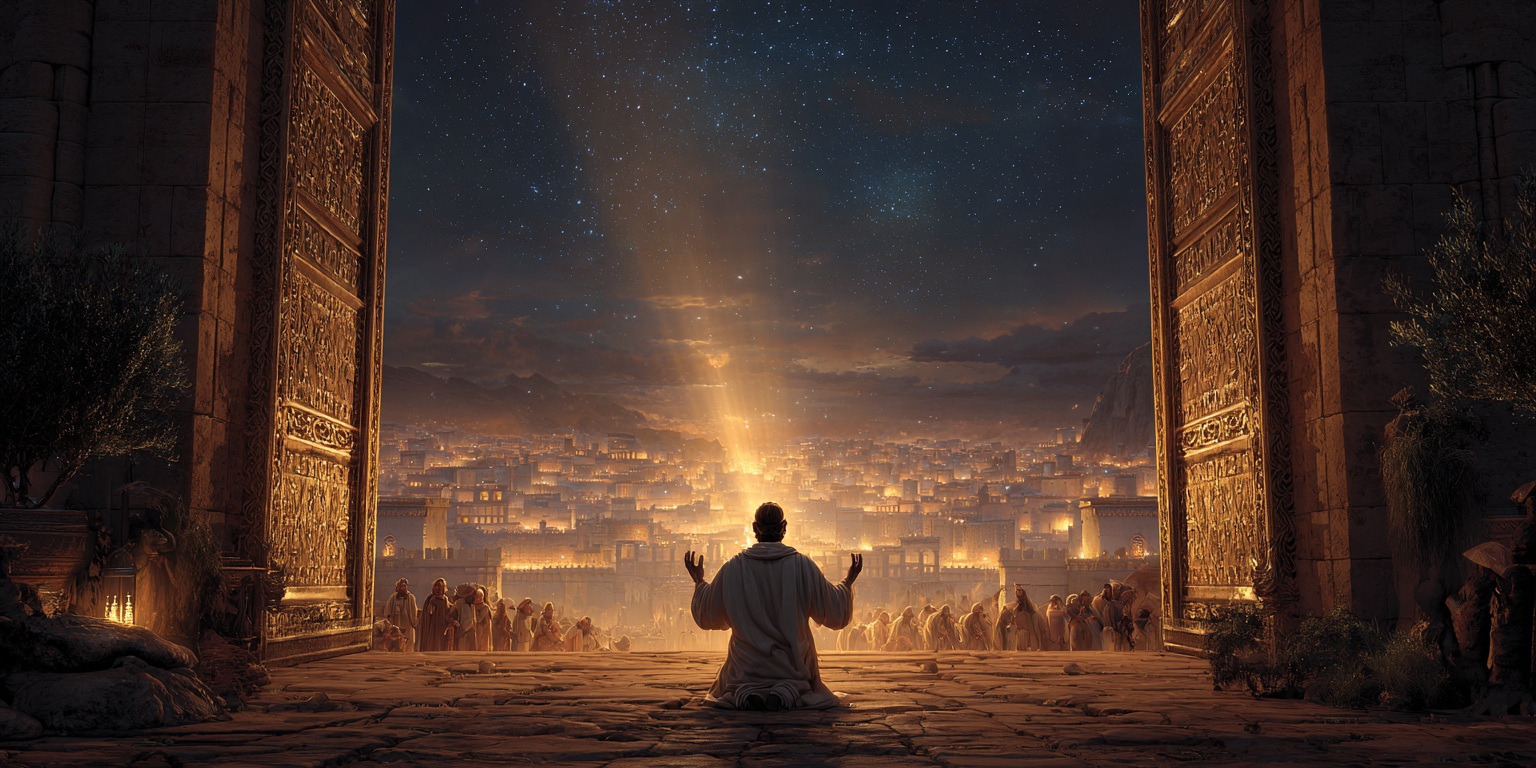

Then he came there to a cave and spent the night there; and behold, the word of the LORD came to him, and He said to him, “What are you doing here, Elijah?” 1 Kings 19:9
Dear People Who Keep Company with God,
After running away from Jezebel, Elijah sought refuge in a cave on Mount Horeb, feeling defeated and alone. In this moment of seclusion, Elijah had a divine encounter. God spoke to him, not through thunder, fire, or earthquakes, but in a “gentle blowing,” or as one translation puts it, “a still small voice.” This voice, this whisper of God, brought Elijah comfort, reassurance, and a new vision in his darkest hour.
Horeb, also known as Mount Sinai, was holy ground in Elijah’s time. It is where Moses encountered the burning bush (Exodus 3:1-2), struck the rock for water (Exodus 17:6), received the Ten Commandments (Exodus 19-20), and received instructions for building the Tabernacle (Exodus 25-31). It’s also where the Lord appeared to Moses and the 70 elders who ate in His presence (Exodus 24:9-11).
Elijah comes to this sacred ground, expecting to experience God's glory. Instead, he ends up sitting in a cave, feeling despair. There, God asks him, "What are you doing here?" Elijah pours his heart out to the Lord, saying, “I have been very zealous for the LORD, the God of armies; for the sons of Israel have abandoned Your covenant, torn down Your altars, and killed Your prophets with the sword. And I alone am left; and they have sought to take my life” (1 Kings 19:10).
Then, God sends a mighty wind, but isn’t in the wind. He sends an earthquake but isn’t in the earthquake. Finally, God sends fire, but isn’t in the fire. God again asks, “What are you doing here?” And Elijah repeats his complaint, “I have been very zealous for the LORD, the God of armies; for the sons of Israel have abandoned Your covenant, torn down Your altars, and killed Your prophets with the sword. And I alone am left; and they have sought to take my life” (1 Kings 19:13-17).
It is the same conversation. What has changed? Elijah remains in despair. Yet now, Elijah is more aware of God’s presence on a personal and relational level. On this sacred mountain, where God moved powerfully, Elijah discovers that God cares about him as a person – not just as a prophet or for his success – and with the still small voice speaks to him in a deeply relational way.
We have our version of holy mountains – moments when the Scriptures were alive and powerful, times we’ve experienced the power of the Holy Spirit, and those beautiful days that Job so aptly described, “When my steps were bathed with cream, And the rock poured out rivers of oil for me!” (Job 29:6) When facing heartbreak, revisiting those defining moments can be helpful, but only if we allow those memories to fill us with faith, strength, and courage to face our circumstances rather than run from them.
The good news is that we have something even more significant than what Elijah experienced. Jesus promised that the Father would send us another “Advocate,” “Counselor,” or “Helper,” just like Him (John 14:16-18). The Holy Spirit loves us, cares for us, and stands by our side, especially when life feels overwhelming. Just like in Elijah’s story, the still, small voice of the Holy Spirit offers us a fresh start—a new beginning filled with life, joy, peace, and purpose, something we all deeply need.
Many Blessings, BW

Recent posts

Prophetic Trends
So we have the prophetic word made more sure, to which you do well to pay attention as to a lamp shining in a dark place, until the day dawns and the morning star arises in your hearts.
- 2 Peter 1:19
Dear People Who Keep Company with God,
Peter compares prophecy to a lamp shining in a dark place. Without its light, the church can drift into worldliness and spiritual darkness. When prophecy is embraced in a healthy way, it helps us see clearly and walk wisely. Right now, the Holy Spirit is highlighting how He is shaping prophetic ministry in this season, helping us better understand and walk in it.
A cleansing is taking place. God is removing performance, sensationalism, celebrity culture, and vague, prediction-driven ministry. He is restoring the prophetic to its true purpose, rooted in His heart, His Word, and His character. The Holy Spirit is refining the prophetic, not discarding it.
While prophecy includes words of knowledge, healings, miracles, signs, and even insight into future events, these are not its central focus. At its core, prophecy exists to reveal Jesus, honor Him, and draw attention to Him. The Holy Spirit is bringing the prophetic back to a simple place of listening to Him, loving Him, and helping others see Him more clearly.
Words about future events are a valid part of biblical prophecy. Jesus said the Spirit would show us things to come (John 16:13). At the same time, the Holy Spirit has been emphasizing prophecies that shape our growth. There is a renewed focus on identity, courage, repentance, and unity. The prophetic is not only informative; it is transformative.
The Holy Spirit is raising up voices that reflect the Father's heart. These are voices that can correct without crushing, warn without wounding, and invite people into a life marked by hope. The tone is shifting, and that shift itself is evidence of the spirit at work.
He is also teaching the church how to weigh and discern the prophetic. This may be one of the most important developments of all. The body of Christ is maturing. People are no longer receiving everything uncritically. They are learning to test the spirits, weigh words carefully, look for fruit, examine motives, measure everything against Scripture, and value character. As the church matures, it becomes a safer place for the prophetic, and the prophetic strengthens the church's health.
For a long time, prophetic ministry largely lived “out there” in conferences, online platforms, and itinerant personalities. That season played an important role in God’s restoration of the prophetic to His people. Now it feels as though God is bringing it into the church's living room. In that space, there is room for accountability, ongoing discipleship, shared discernment, and life together.
The prophetic is not meant to stay within the walls of the church. It calls the church into the world God loves. There is a growing expression of prophetic evangelism that feels natural rather than awkward, marked by boldness in speaking life into dark places and by spiritual authority in everyday moments. The Holy Spirit is weaving prophetic ministry into the fabric of daily life.
Clearer, humbler, and more Christ-centered prophetic voices are emerging from the ashes of past mistakes and failures. The Holy Spirit is not only shaping prophetic ministers. He is forming a prophetic people. Every believer can learn to hear His voice, grow in discernment, and reflect the Father’s heart to those around them. The Holy Spirit is inviting you to embrace this and become one of the prophetic voices He is raising up in this hour.
Many Blessings, BW


The Pen of a Ready Writer
My heart is moved with a good theme; I address my verses to the King; my tongue is the pen of a ready writer.”
- Psalm 45:1
Dear People Who Keep Company with God,
We are living in a significant prophetic era. According to the Hebrew calendar, the current decade, 5780 to 5789, which corresponds to 2020 to 2029, is represented by the Hebrew letter Peh, meaning "mouth." The focus of this season is communication, our voice, and the power of speech. As we enter the second half of this decade, the call for a higher form of speech is becoming clearer. This is a call to unite our hearts with His and to use our words as instruments of blessing, healing, and truth.
Psalm 45 beautifully connects the heart and the mouth. It opens with the words, “My heart overflows with a good theme.” What resides in the heart will eventually find expression through the mouth. Jesus affirmed this when He said, “Out of the abundance of the heart the mouth speaks” (Matthew 12:33-37). Our words are the windows into our inner lives.
I have always been moved by the way the psalmist describes Jesus, saying, “Grace is poured upon Your lips.” His words were saturated with grace because His heart was perfectly aligned with the Father. I see this as a description of Jesus, and an invitation for us. Our words shape atmospheres. They can release life and hope or stir confusion and darkness. God desires a people who speak as His mouthpieces, with words formed by His heart. Grace-filled words flow from a grace-filled heart.
This is why stewarding our voice matters so much right now. During the height of the pandemic, the Lord gave me a sobering prophetic word: “Some will be given a voice, and some who have a voice will lose it. My plan is for you to have a voice. Do not lose it through the compromise of truth.” At the time, I did not fully understand the weight of those words. Since then, we have watched many prominent voices in the church lose credibility, clarity, or influence.
Scripture gives us a vivid picture of what a God-shaped voice sounds like. In Revelation, John describes the voice of Jesus as a trumpet, the sound of many waters, and a sharp, two-edged sword. (Revelation 1:10, 15-16) This vision does not stop with Jesus alone. It extends to His people. “The Spirit and the Bride say, Come” (Revelation 22:17). This is the body of Christ, unified and speaking together through the power of the Holy Spirit.
God’s desire is for a collective voice on the earth. This isn’t about everyone having the same opinion or perfect agreement on every matter. It’s a united Bride who speaks with one heart, free from lesser loyalties and personal offenses. It’s the voice of a people in love with Jesus, surrendered to Him, and aligned with His purposes.
That is the tension of this moment. Will we speak with both grace and truth, or will we grow silent and careless with our words?
Your voice matters. Do not lose it. Let God shape, guard, and use your voice for His glory.
Many Blessings, BW


The Benediction
The grace of the Lord Jesus Christ, and the love of God, and the fellowship of the Holy Spirit be with you all.
- 2 Corinthians 13:14
Dear People Who Keep Company with God,
When Paul closed his last letter to the Corinthians, he wasn’t just wrapping things up nicely. His final words carried the heartbeat of everything he had written. This wasn’t a formula. It was a holy invitation into the life and fullness of the Father, Son, and Holy Spirit.
Paul had walked a long and emotional road with this church. His first letter brought correction, calling out pride, division, immorality, and immaturity. His second letter opened his heart wide. You can see Paul’s love, his hurt, and his hope for reconciliation. None of it was easy. But after all the hard conversations and tears, Paul didn’t end his letter in frustration or disappointment, but with a blessing. He called them to lift their eyes to see the grace, love, and fellowship that flow from God Himself.
I love how intentional Paul’s words are. He begins with “the grace of the Lord Jesus Christ.” Grace is always where life with God begins and ends (Revelation 22:21). It’s what met Paul on the road to Damascus and turned his passion for religion into compassion for people. Grace reminds us that failure isn’t final, and no one is beyond redemption. For a church that had stumbled in so many ways, that reminder must have felt like fresh air to tired hearts.
Then Paul speaks of “the love of God.” That’s the love of the Father, the love that started our redemption. He loved us before we ever turned toward Him. It’s the love that sent Jesus into our world, carried Paul through every trial, and held that fragile church together. The Corinthians knew what broken human love looked like, but Paul points them to a love that’s steady, pure, and healing.
Finally, Paul prays that they would know “the fellowship of the Holy Spirit.” The word koinōnia means partnership and shared life. Through the Spirit, we’re united with Christ and with each other. The Spirit draws us into communion, not competition. For a church full of division and ego, that closing line was a gentle invitation back to shared life, calling them to walk in step with the Spirit who brings us together.
And really, this blessing reflects Paul’s own story. He wasn’t speaking as a theologian trying to write a perfect ending. He was speaking as a man who had lived it. He had been rescued by the grace of Christ, fathered by the love of God, and strengthened by the fellowship of the Holy Spirit. Out of what he had personally experienced, he spoke a blessing over the church.
So when you hear these words today, don’t just treat them like a nice goodbye. They’re alive. They carry the heartbeat of God. They invite us to live every day out of grace, love, and fellowship, letting these words become part of how we see the Lord and people, and of how we walk with the One who is all three Himself.
Many Blessings, BW


The Testimony of Jesus
For the testimony of Jesus is the spirit of prophecy."
- Revelation 19:10
Dear People Who Keep Company with God,
When John, as an old man, received the Revelation of Jesus Christ on the island of Patmos, he was overwhelmed by the glory of what he saw. At one point, he fell at an angel’s feet to worship, but the angel quickly corrected him: “Don’t do that! Worship God! For the testimony of Jesus is the spirit of prophecy.” In that moment, John was reminded, and we are invited to remember, that even the most extraordinary revelations and heavenly visions point back to one Person: Jesus Christ.
That brief exchange reveals an important truth: every genuine prophetic word reflects the heart of Jesus. Prophecy isn’t simply about predicting the future or sharing spiritual insights; it’s about revealing who Jesus is and what He’s doing among His people and in the world.
From Genesis to Revelation, Scripture tells one unified story of God’s plan to redeem and restore humanity through His Son. The prophets looked forward to His coming, the apostles testified to His resurrection, and the Holy Spirit continues to reveal Him today. Every genuine prophetic voice, regardless of the time or place, ultimately finds its meaning in Him.
The angel’s words remind us that the essence of true revelation is seeing and knowing Jesus Himself. Without Him, prophecy becomes hollow and noisy. With Him, it brings life, conviction, and hope.
The Holy Spirit, the Spirit of prophecy, works to make Jesus known (John 15:26). Whether through Scripture, a prophetic message, or a quiet word of encouragement, His goal remains the same: to draw hearts closer to Christ. He doesn’t point to personalities or movements; He points to King Jesus.
That truth anchors us in a world full of voices claiming to speak on God's behalf. We can discern what we hear by asking a simple question: Does this reveal Jesus? If it magnifies Him, reflects His character, and aligns with His Word, then it carries the true spirit of prophecy. But if it exalts people, stirs up fear, or departs from the gospel, it’s something else entirely.
At its core, prophecy invites us to deepen our relationship with Jesus. It’s not just about sharing information, it’s about transformation. When God speaks, He doesn’t merely predict; He calls us to repentance, trust, and fellowship with Him.
One of the most powerful prophetic messages we can all share is our personal testimony of Christ: what He has done in our lives, how He has transformed us, and how His grace continues to shape us each day. As the apostle Paul wrote, “You can all prophesy in turn so that everyone may be instructed and encouraged” (1 Corinthians 14:31).
The same Holy Spirit who once inspired the prophets now lives within us. We’re invited to join the same prophetic flow that the angel spoke to John about in Revelation, the revealing of Jesus Christ through our words and lives, so that others might see Him more clearly and come to know the One to whom all heaven points.
Many Blessings, BW


Autumn Grace
So Naomi returned, and with her Ruth the Moabitess, her daughter-in-law, who returned from the land of Moab. And they came to Bethlehem at the beginning of barley harvest.
- Ruth 1:22
Dear People Who Keep Company with God,
Every season of life we experience offers a gift from God. It's often said that autumn is the best season because it looks as beautiful as it feels. Autumn arrives with its own special charm: crisp air, colorful leaves, and a sense of both harvest and change. The cooler temperatures and changing colors remind us that life moves in seasons, where endings and new beginnings frequently occur. In Scripture, the harvest holds deep spiritual significance, and one of the clearest examples is found in the Book of Ruth.
Ruth and Naomi arrived in Bethlehem at the start of the barley harvest—a detail full of meaning. In the Bible, harvest often symbolizes God’s provision and the fulfillment of His promises. For Naomi, who had returned home feeling hollow and bitter after years of loss, the harvest marked a turning point. It was during this season that God’s faithfulness began to restore the loss and brokenness in Naomi’s life.
For Ruth, a Moabite outsider, the harvest signified the beginning of belonging and redemption. The timing of their arrival in Bethlehem was not accidental; it was a divine appointment, a reminder that there are times of refreshing and renewal from the presence of the Lord, even when everything seems lost.
As Ruth gleaned in Boaz's fields, God’s compassionate heart was revealed. The law of Israel provided for the poor and foreigners during the harvest (Leviticus 19:9–10). What could have been a time of despair turned into a season of abundance thanks to God’s wisdom and kindness. Autumn’s lesson is clear: when we trust Him, God provides not just enough, but more than enough.
Autumn reminds us that every season in life serves a purpose. Naomi and Ruth faced famine, grief, and displacement, but their arrival in Bethlehem marked a major change. Just as autumn leaves burst with color before falling, periods of loss can prepare us for new beginnings. Ruth’s faithfulness in the fields led to her marriage with Boaz, a union that placed her in the lineage of King David and ultimately, Jesus Christ.
This season encourages us to reflect on the harvests in our own lives. Paul reminds us in Galatians 6:9: “Let us not lose heart in doing good, for in due time we will reap if we do not grow weary.” Like farmers waiting patiently for crops to ripen, we are called to persevere, trusting God’s perfect timing. The effort of faith, whether in relationships, work, or spiritual growth, produces fruit in its season.
This autumn, remember Ruth gleaning in the fields of Bethlehem. What began as a time of loss and emptiness ultimately became a testament to God’s redemptive power and compassion. Autumn, with its cooler air, colorful leaves, and bountiful harvests, whispers that God is always at work, transforming emptiness into fullness and weaving stories of hope and renewal into our lives.
Many Blessings, BW


A Hearing Heart
Ask! What shall I give you?
- 1 Kings 3:5
Dear People Who Keep Company with God,
At Gibeon, the Lord appeared to Solomon in a dream and extended an extraordinary invitation. Solomon’s reply showed genuine humility and wisdom. Instead of asking for riches, long life, or victory over enemies, Solomon asked for an understanding heart—literally, a hearing heart—to lead God’s people and to discern between good and evil.
Why did Solomon ask for this? He explains in verse 7, “I do not know how to go out or come in.” This was a common Hebrew phrase that expressed leadership—how to act wisely in all areas of life, both public and private, especially when dealing with others. Solomon understood he was stepping into a role that greatly exceeded his abilities. He was now king over a vast people, and he felt the weight and gravity of that responsibility.
The phrase "going out and coming in" appears several times in the Old Testament Scripture and carries deep significance. It relates to managing life’s routines, battles, and spiritual direction properly.
We see this in Numbers 27:15–17, when Moses, near the end of his life, asks God to appoint a successor. His one request? That God would set a man over the congregation “who may go out before them and go in before them… that the congregation of the Lord may not be like sheep which have no shepherd.” Moses isn’t just talking about movement; he’s talking about leadership. A good leader knows when and how to lead people forward and when to bring them back in safety, rest, and worship.
Moses later reflects in Deuteronomy 31:1–2, “I am no longer able to go out and come in,” acknowledging his transition out of leadership. In his older age, he understood it was time for someone else to assume that responsibility.
Joshua 14:11 records eighty-year-old Caleb’s bold declaration that his strength for “going out and coming in” had not diminished. This phrase once more indicates confidence, power, and leadership, even in older age.
It wasn’t just about kings or warriors, though. In Deuteronomy 28:6, God promises, “Blessed shall you be when you come in, and blessed shall you be when you go out.” This is covenant language. It’s about God's presence in every part of life, whether we’re stepping into daily responsibilities or returning home. His blessing covers both.
Jesus reiterates this promise in John 10:9 when He says, “I am the door. If anyone enters by Me, he will be saved, and will go in and out and find pasture.” In Christ, we find security, guidance, and provision. We are not left to wander. He is both the gate and the Shepherd, ensuring we find pasture wherever we go.
So, when Solomon asked for a heart that would hear, it wasn’t just for personal insight; it was to lead well, live wisely, and walk in step with God. He understood that without God’s wisdom, he couldn’t properly “go out or come in.” His request shows that leadership, maturity, and a fulfilling life all start with humility and a listening heart. May we, like Solomon, ask for hearts that hear so that we, too, may be blessed as we go out and come in under the care of our Good Shepherd.
Many Blessings, BW

